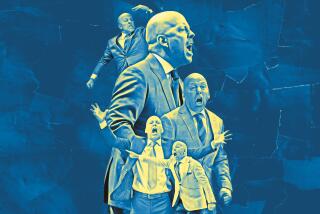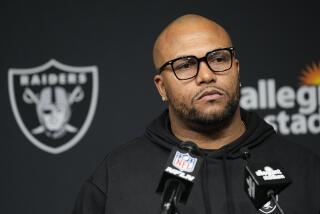Coughlin’s new style is a winner for Giants
- Share via
CHANDLER, Ariz. -- It took more than two seasons, but New York Giants linebacker Antonio Pierce finally discovered something astounding about his coach.
Tom Coughlin has teeth.
And cheekbones.
And a laugh.
“He’s let guys a little bit inside, get to know who he really is,” Pierce said Monday at the team’s first Super Bowl XLII meet-the-media session. “I think maybe before this year that a lot of guys didn’t talk to him on a daily basis, didn’t know who he really was.”
For Pierce and many of his teammates, that changed in the off-season when the normally starched Coughlin surprised his players with a private casino night during a mini-camp, and a bowling night during training camp.
“It got us closer together, let us see a different side of Coach,” Pierce said. “Whenever you’ve got your head coach bowling -- and he wasn’t out there throwing strikes, trust me, he threw a lot of gutter balls -- but when you’ve got your head coach doing that and being more personable, you have a better understanding of who he is.”
Those examples aside, the changes in Coughlin have been subtle. His rigid rules are still in place, he’s not warm and fuzzy, he still looks as tightly wound as ever on the sideline, and yet he’s now closer than ever to his players.
And that’s by design. After last season, when his job security was shaky at best, Coughlin met with Giants co-owners John Mara and Jonathan Tisch to discuss his future with the franchise. Together, they established a few priorities: Coughlin was to do whatever he could to make quarterback Eli Manning a better player, and he was to improve his relationships with his players and the media.
“Let’s get this straight: He hasn’t undergone a personality transplant at age 61,” said Pat Hanlon, the Giants’ vice president of communications. “What he’s done is tweak his approach to ensure the lines of communication between he and his players are efficient.”
If Coughlin stands for anything, it’s efficiency. He has shown that throughout his career, from his days at Boston College, when he transformed a struggling program into a top-20 team; to Jacksonville, where he was the first coach of the expansion Jaguars and led them to the playoffs in only their second season; to New York, where he became the first Giants coach since Bill Parcells to reach the postseason three years in a row.
Despite that success, Coughlin’s job was in jeopardy throughout much of this season, and perhaps even when the playoffs began. After all, the Giants hadn’t accomplished anything under him in the postseason. Before they won at Tampa Bay in a wild-card game, the Giants hadn’t won a playoff game since Jim Fassel was coach in 2000.
The season was easier in only one respect. Tiki Barber was gone. Although the running back was the Giants’ top threat on offense, he was also Coughlin’s most outspoken critic.
Now, among the players, respect for Coughlin seems to have reached a high. The team has won 10 games in a row on the road, including hard-fought playoff victories at Tampa Bay, Dallas and Green Bay, and the players stand steadfastly behind their coach. So do the Giants’ owners.
“Tom really delivered on what he said he was going to do,” Giants co-owner Steve Tisch said. “Not only has ownership and senior management been extremely impressed, but it’s had a tremendous impact on the players and the coaching staff. This is a guy who really defined leadership this season.”
Coughlin didn’t do that alone. Hugely popular with the players was his decision to form an 11-player leadership council to act as intermediary between the head coach and locker room. It was a move atypical of Coughlin, for years viewed as a whistle-wielding dictator, and one that showed he was serious about making productive changes.
“It made guys feel very empowered,” said defensive end Michael Strahan, a member of the council. “He gives us a lot of input.”
The system works both ways. Coughlin said the council members “have gone forth to communicate with the rest of our team so that everyone was aware of not only what we were doing, but why we were doing it.”
Not everyone immediately grasps the “whys” of Coughlin’s rule book. For instance, some players in Jacksonville were unhappy with the coach’s insistence they wear coats and cloth ties -- no bolo ties -- when traveling with the team. They couldn’t wear sneakers in hotels, only leather dress shoes. And assistant coaches weren’t allowed to wear sunglasses, even on the brightest of days, because Coughlin wanted players to be able to look into their eyes.
“When he was here in Jacksonville, I caught him breaking his own rule one time and pointed it out to him,” former Jaguars defensive end Jeff Lageman recalled. “I busted him in the hotel elevator when he was coming down from his room wearing tennis shoes. I told him, ‘Fine yourself now. Turn your dang money in to the charity account because you have broken your own rule.’ He acted embarrassed and went back up and changed into his other shoes.”
Lageman said the rules drove him crazy at first, until he began to realize the logic to Coughlin’s guidelines, grueling practices and stern approach.
“He wanted to put as much pressure on players and coaches that he could possibly put on them to see how they would respond,” he said. “He wanted to weed out the weak, the people he perceived weren’t physically or mentally strong.
“He ran practices the same way. He tried to create stressful situations in practice, very demanding in practice, so that when it becomes game time it’s easy. . . . The guy doesn’t leave many stones, if any, unturned.”
Mike Panos, who played middle linebacker on Coughlin’s Boston College teams in the early 1990s, said he appreciated the coach at the time but even more now.
“It was all out all the time, whether it was on the field, in the weight room, or in the meeting rooms,” Panos said. “That doesn’t mean you can’t smile or crack a joke here or there. But in every motion that he made, every breath that he took, every ounce of energy was put toward winning ballgames.
“Many players might not appreciate him because they think, ‘This guy’s getting in my grill, making me show up on time and work harder than I’ve ever had to work before.’ But you look back and think, ‘He just wanted me to be accountable for my teammates and myself, and to win.’ ”
Panos says his friends might think he’s conflicted about Super Bowl XLII. Rest assured, he’s not.
“I’m a lifelong Patriots fan,” he said. “And I’m rooting for the Giants.”
--
More to Read
Go beyond the scoreboard
Get the latest on L.A.'s teams in the daily Sports Report newsletter.
You may occasionally receive promotional content from the Los Angeles Times.











